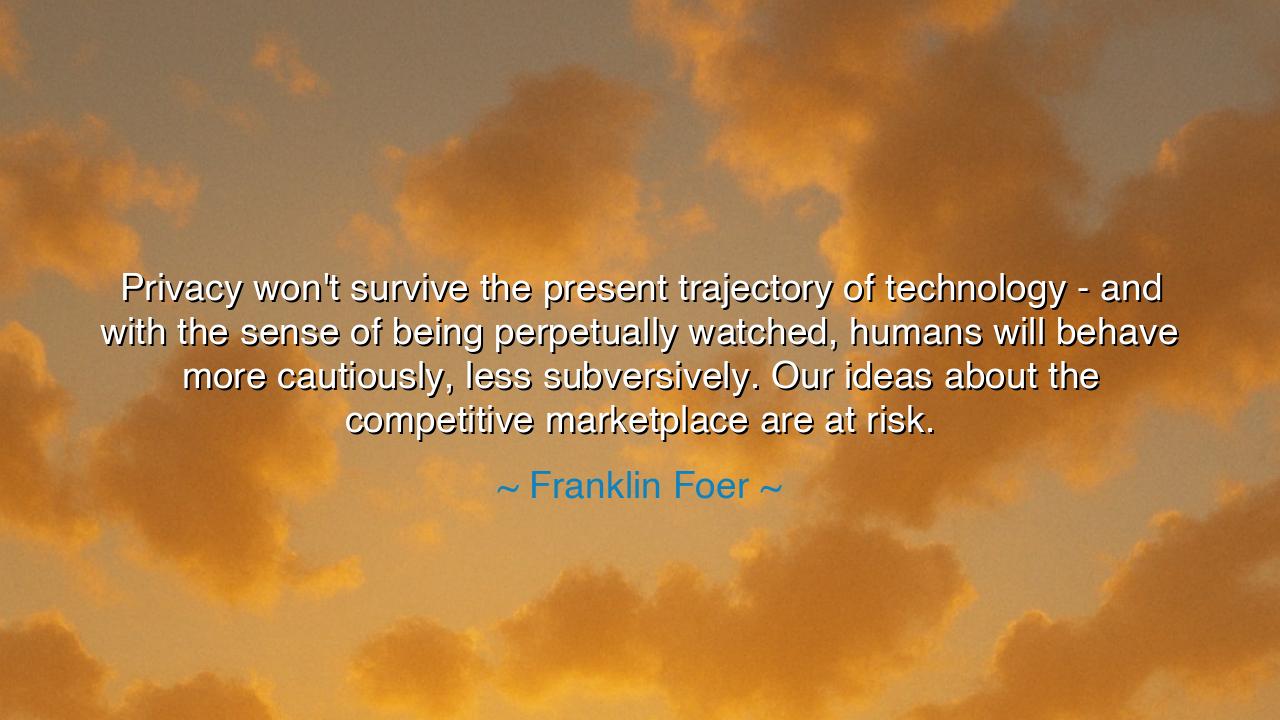
Privacy won't survive the present trajectory of technology - and
Privacy won't survive the present trajectory of technology - and with the sense of being perpetually watched, humans will behave more cautiously, less subversively. Our ideas about the competitive marketplace are at risk.






In the solemn words of Franklin Foer, a warning is given that pierces like an oracle: “Privacy won’t survive the present trajectory of technology—and with the sense of being perpetually watched, humans will behave more cautiously, less subversively. Our ideas about the competitive marketplace are at risk.” This is no passing observation but a lament for the spirit of freedom, a prophecy of what happens when the human soul is forever exposed to the eye of surveillance. His voice calls across generations: beware, for the loss of privacy is not the loss of secrecy alone, but the erosion of creativity, rebellion, and even progress itself.
For what is privacy but the sanctuary of the mind, the chamber where new thoughts are born, where dissent dares to speak, where the individual shapes their truest self without fear? If this sanctuary falls beneath the weight of endless observation, then humanity itself is reshaped. Technology, though a tool of wondrous possibility, becomes a chain if its path leads only to control. Foer sees clearly that when people believe they are always watched, they will restrain their own voices, taming their instincts, silencing their subversions—the very subversions that often ignite revolutions of art, science, and justice.
History gives us testimony to his words. Recall the empire of East Germany, where the Stasi, with webs of spies and watchers, monitored the lives of ordinary people. Though life continued, it was marked by caution; speech was guarded, creativity restrained, friendships shadowed by suspicion. The nation did not collapse from famine or plague, but from the weight of surveillance upon the human spirit. So too, Foer warns, might modern society, if its technology—instead of liberating—turns its power to watching.
And what of the marketplace? Foer points to a danger greater still: that surveillance reshapes not only personal freedom, but the very flow of commerce and competition. A true market thrives on daring, on bold risks, on new ideas that challenge old empires. But in a world where every movement is traced, every transaction recorded, boldness withers. Companies and individuals alike will act not with courage, but with caution, fearing the gaze of governments or corporate giants. The competitive marketplace, once a battlefield of innovation, becomes a field of conformity, where only those aligned with power survive.
The meaning of Foer’s words is profound: the danger of the present age is not only that machines learn to see us, but that their gaze teaches us to unlearn courage. Technology is not inherently evil, but when its trajectory strips privacy from the human soul, it reshapes the very fabric of society. Creativity becomes obedience. Subversion becomes silence. And the marketplace, once an engine of discovery, stagnates beneath the weight of fear.
The lesson for us is urgent: guard your privacy as you would guard your freedom, for they are bound together. Do not accept passively the notion that surveillance is the price of safety, or that convenience must be purchased with exposure. Demand transparency from those who build and control these tools. Support laws, companies, and practices that honor privacy. And in your own life, remember to cultivate spaces of silence and solitude, where your thoughts are your own, unseen and unrecorded.
So let Foer’s words be carved into memory: a society without privacy is a society without boldness. And a society without boldness cannot innovate, cannot grow, cannot live fully. Be watchful, then, not only of those who watch, but of the ways you guard your inner sanctuary. For in protecting privacy, you preserve not just your secrets, but the fire of human creativity itself—the daring spirit that builds new worlds, that resists tyranny, and that keeps the marketplace of ideas alive.






AAdministratorAdministrator
Welcome, honored guests. Please leave a comment, we will respond soon